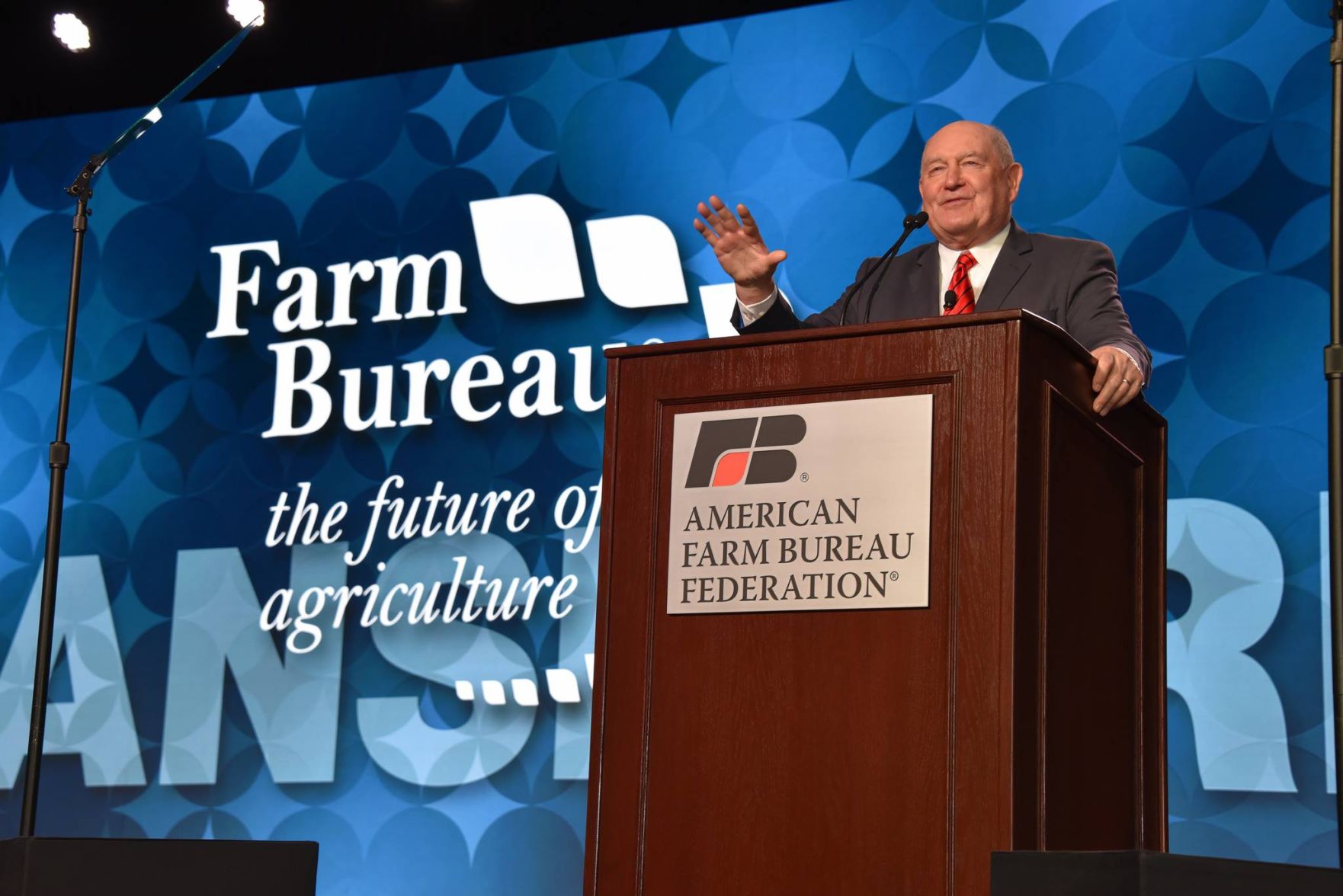As Jimi Hendrix once was the opening act for The Monkees or The Who opening for Vanilla Fudge, so was Secretary of Agriculture Sonny Perdue the opening act for President Donald Trump at the 99th American Farm Bureau Federation’s annual meeting at Nashville, Tennessee, Jan. 8.
Perdue’s remarks were the set-up for his boss’ speech to the group later in the day. In his speech, Perdue presented the recommendations of the Agriculture and Rural Prosperity Task Force formed last April.
Perdue said the report contained more than 100 practical, actionable recommendations for economic growth.
“We took seriously our charge,” Perdue said. “To investigate circumstances and situations in the rural areas of our country, to formulate situations limiting prosperity and to report back to the president.”
Perdue said people like Farm Bureau members are those who have to live with the policy decisions made in Washington.
“We know the overall economy is booming again, but for anyone who lives and works in what used to be called ‘fly-over country’ knows, rural America has not exactly kept pace.”
The task force’s recommendations, as released by the administration cover five areas: e-connectivity, quality of life, rural workforce, technology and economic development.
E-connectivity: through reliable and affordable high-speed internet connectivity.
Improving quality of life: through modern utilities, affordable housing, efficient transportation and reliable employment integrated with social indicators like access to medical services, public safety, education and community resilience.
Supporting a rural workforce: Through identification of employment needs, attracting available workers from urban and rural centers alike, and providing the workforce with training and education to best fill the available needs, along with partnerships with local businesses and organizations to identify gaps, to work with all levels of educational institutions to provide career training and development, to fine-tune existing training programs and to grow apprenticeship opportunities to develop the required workforce.
Harnessing agricultural technological innovation: Through increased crop yields and quality, nutritional value and food safety. Innovations in manufacturing, mining and other non-agricultural industries can enhance worker efficiency and safety. “At the core of these developments that will further grow the rural economy is the expansion of STEM education, research, regulatory modernization and infrastructure. Leveraging these innovations in an increasingly data-driven economy will also require further development of rural data management capabilities,” the task force report said.
Economic development: Infusing rural areas with stronger businesses and agricultural economies through expanding funding options to increase the productivity of farmers and ranchers that will lead to the enhanced viability and competitiveness of rural America. “By promoting innovative farm technologies, energy security, recreation, agritourism and sustainable forest management, communities will be empowered to leverage the bounties of rural America. Investing in rural transportation infrastructure is needed for carrying more ‘Made in America’ products to markets at home and abroad and boosting our country’s global competitiveness.” Reducing regulatory burdens and attracting private capital will support the ultimate mission of empowering rural America.
“Formed out of 22 cabinet departments and federal agencies, the task force enthusiastically embraced the challenges before it,” Perdue said, “to understand the issues that keep America from thriving, to develop a set of solutions to address those issues, and to tear down the walls, among, within and between levels of government that inhibit that growth.”
In other remarks, Perdue spoke to an AFBF audience anxious about loss of markets for their commodities, about the importance of trade to U.S. agriculture and what he said was the priority of successful renegotiations for the North American Free Trade Agreement.
“We know there is certain anxiety about trade,” Perdue said. “I have great faith in President Trump’s skills as a negotiator, and I am quite confident that he will strike a deal that works best for the United States.
“To get a deal, we need all sides to seriously roll up their sleeves and get to work,” Perdue said. “We have put a number of proposals on the table to modernize NAFTA, and critically for agriculture, to address key sectors left out of the original agreement—dairy and poultry tariffs in Canada. Now, we want to see our negotiating partners step up and engage so we can get the deal done.”
In the first year of the administration, the U.S. Department of Agriculture claimed victories in reopening the Chinese market to American beef, signing a protocol to allow exports of U.S. rice to China for the first time ever and easing European Union regulations on citrus exports. South Korea also lifted its ban on imports of U.S. poultry, while Argentina has allowed American pork back into the country for the first time since 1992.
Perdue said USDA has been rolling back excessive regulations following a directive from President Trump. He cited the Waters of the U.S. rule as an example of regulatory overreach negatively affecting farmers.
“You know, sometimes a mud puddle is just a mud puddle,” he said. “We don’t need the federal government coming in and regulating everything to death.”
Along with extolling the administration’s rollback of regulations, Perdue also called on farmers to tell USDA what further regulations should be eliminated by going online to www.regulations.gov and explaining what regulations are most onerous to them.
Perdue told AFBF members that Congress will write the farm bill, but USDA will unveil “farm bill principles” as a roadmap for Congress to use. Perdue added that it will be the administration’s “way of letting Congress know” what the administration has learned from farmers and ranchers.
Larry Dreiling can be reached at 785-628-1117 or [email protected].



